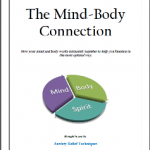How Magnesium Provides Anxiety Relief
Magnesium may be helpful in providing you anxiety relief and having the right amount of magnesium in your body will also prevent other health problems. Unfortunately, many people do not realize its importance and this has lead them to become magnesium deficient.

A deficiency in magnesium can cause debilitating symptoms of anxiety and stress which can also prelude the existence of numerous diseases.
Why? That’s an easy question to answer…stress causes dis-ease!
Health experts refer to magnesium as the relaxation mineral.
If you find yourself easily irritated, parts of your body stiff and ‘crampy’ – you may have a magnesium deficiency. Many people are! For me, my legs will cramp at night and my heart can feel tight! This can make me anxious to say the least. Magnesium relaxes your muscles…so you don’t feel so uptight.
Magnesium plays an essential role in maintaining bone mineralization, and is also involved in muscle contractions and nerve impulses.
Magnesium Health Benefits
There are many benefits you can obtain from having the right amount of magnesium in the body. Firstly, if you suffer with anxiety and stress this mineral will certainly help you achieve anxiety relief naturally. In my opinion it is very important to incorporate magnesium into your own personal anxiety management program, if you are magnesium deficient. I have heard many other anxiety sufferers say they take it daily too.
- Treating Anxiety and Stress
This mineral is often involved in many chemical reactions that are taking place in our body. Several studies have already been made to prove that magnesium deficiency can lead to anxiety and other mental health problems.
- When our body is under stress or we are experiencing anxiety, our body uses up our magnesium stores very quickly. This is how magnesium can help provide anxiety relief.
I can tell when my stores are depleted…my heart feels tight and my leg muscles cramp, I feel tingling in my face, and my anxiety and stress levels begin to rise.
Plus, if you can’t sleep, you become sleep deprived and that depletes your magnesium levels too.
There have actually been studies made to see if people who were put under magnesium supplementation experienced significant improvements in their symptoms of generalized anxiety disorder and stress. This is because having the right amount of magnesium inside the body means that every chemical reaction and other cellular processes are functioning properly…so stress and anxiety may be reduced.
- Helps Prevent Cardiovascular Diseases
Magnesium deficiency may put you at risk of coronary heart diseases. Many people who suffer from a heart attack are stressed, so by taking magnesium for stress and anxiety relief, may prevent a future heart problem too. Studies revealed that those who take supplements that help them meet their daily recommended amount of magnesium are at lower risk of suffering from stroke.
When a person is deficient in magnesium, he will most likely to experience abnormal heart rhythms after having a heart attack. The heart is a muscle…actually it is two…and we know what happens when a person has a heart attack…the heart ‘muscle’ spasms…or cramps.
- Magnesium Maybe Helpful For Preventing Type II Diabetes
Type 2 diabetes and severe diabetic retinopathy are two examples of illnesses that can possibly develop if your body is deficient in magnesium. This mineral is a great help for carbohydrate metabolism. Magnesium also aids insulin activity and release so that blood glucose levels are controlled. If you want to put yourself at lower risk of suffering from type 2 diabetes see to it that you increase your daily magnesium intake.
- Helps Prevent Osteoporosis
Magnesium plays a crucial role in the process of bone-building. In fact, your bone is a major reservoir for the mineral magnesium. It is magnesium that supports the functioning of enzymes that are involved in the formation of healthy bones. According to a report published in the Journal of the American Geriatrics Society, taking natural supplements that contain magnesium will help prevent bone loss by increasing bone mineral density.
Foods Rich In Magnesium
To spare yourself from incalculable suffering brought about by magnesium deficiency; see to it that your daily diet includes magnesium-rich foods such as broccoli, wheat bran, spinach, almonds, cashews and kidney beans. Avoid drinking too much coffee and soda.
There are many other foods that reduce anxiety too. Cigarette smoking and drinking alcoholic beverages are two habits that you should try to overcome, if you want to stop draining your body of magnesium.
- Most people actually benefit from taking magnesium on a daily basis.
If you are needing to supplement your body to find anxiety relief this is one mineral I add to my list of supplements.
Natural Anxiety Supplements
There are also natural anxiety supplements that contain the right balance of natural ingredients, vitamins and minerals, including magnesium, to provide anxiety relief, such as ProVanax.
It is an all natural supplement which contains clinically proven ingredients and will help you obtain the right level of minerals to increase dopamine levels, optimize serotonin levels, reduce cortisol levels and improve your sleep.
Affiliate Disclosure
My website contains affiliate links, which means if you purchase any products mentioned in my articles, I may receive a commission. If you do, thank you!






I am going to have to try this. Oh, and if our bodies, as you stated, use up our magnesium when we are stressed then I must be completely out of it. lol.
Hi Rosa,
Magnesium is a supplement I take everyday, for so many reasons! It helps me with stress and anxiety and the causes it gives me. If I am stressed and my anxiety levels are high, I get the worst leg cramps ever! My husband says, quick, go and take more magnesium!
He can now tell immediately when my magnesium levels are too low. I am a magnesium supplement believer 🙂
Any of my friends who know me well…know there is a bottle close by.
What kind of magnesium supplement do you take? I’ve noticed several different kinds and it is confusing me on which one is the best for stress and leg cramps.
Hi Lynn,
I just take a regular magnesium supplement (no particular brand) usually found in my supermarket (as they’re the cheapest and they all contain magnesium). If I can I buy the 500mg. Sometimes they are only 325mg tablets or capsules, so I take 2 a day. One in the morning and one at night.
I hope that helps. ~ Jennifer
Yo yo doggg. I love dis. It’s deep man. Like I never knew that magnesium was one of the chemicals running round my body..and making me stressed out..so taking more magnesium can help me man. This article really helped me and I didn’t know it could combat diabetes man! My cousin has diabetes..so this has helped me a lot. All I can say is THANK YOU! A++
Hi Gabriel,
Magnesium is is one mineral that I would call my ‘lifesaver’ and I would also agree that if you are magnesium deficient your stress levels would be high and it could certainly be making you feel stressed out!
However, if your cousin has diabetes it won’t ‘combat’ it for him.
Type 2 diabetes is generally a lifestyle disease…that is it is caused through poor diet choices, therefore magnesium maybe deficient in the body…and add to the problem.
I hope I have explained myself better, because if he has type 1 diabetes, that is a whole new story.
Hi there! Thanks for the response.
It is fantastic to see a website that doesn’t want my money or credit card details that actually cares about me for free!
Thanks so much Jennifer I will be recommending you to all my family and friends and have just shared this link on fb.
Totally agree with what your saying. What would you say is the best form of magnesium to take?
Thanks Gabriel for your kind words.
Magnesium comes in tablet form as a pure magnesium supplement and the mg dosage, would depend on an individual’s daily requirement.
I personally for example, know I am magnesium deficient and I take a 500mg supplement daily.
Many natural supplements for anxiety contain magnesium, so if a person requires a minimal dose, these types of supplements would most likely be sufficient.
Jennifer
I love natural calm slow magnesium. I’m unable to use it regularly though because I retain fluid. Do you have any advice on this?
I am thinking it is a nutrient balance thing, like maybe I need b vit? Calcium?
Hi Lily,
I have heard some people have that problem, but I don’t…perhaps it’s because I do take vitamin B and my magnesium supplement is ‘magnesium oxide’ whereas I think the Natural Calm is magnesium citrate.
I have read that the magnesium citrate is used for constipation and that it draws water into the bowel. Perhaps that is one of the possible causes for your fluid retention. I know that doesn’t specifically help your query and I am only guessing with the fluid retention, but magnesium works for me on a daily basis.
I don’t take calcium at all. There is a big interplay between magnesium and calcium that many people are unaware of. Taking too much calcium actually suppresses magnesium which prevents proper calcium uptake, so too much calcium is not a good thing.
As with everything else your mileage may vary.
Jennifer
PS Thank you for visiting my website! 🙂
But we do need calcium to absorb magnesium so are you saying not to take too much calcium or not at all. I’ve also heard to take magnesium citrate over oxide. I’m a nurse and these are just some things docs have said over the years.
Hi Yvette,
You are far more qualified than me! I have no qualifications, only my own trial and error and lots and lots of research. However I do have my own opinion and I am going to share it with you.
Yes, we need calcium to absorb magnesium, this is where I see the biggest problem lies. Most people have too much calcium in their diet! Therefore they get a calcium overload and their body can’t cope. Our magnesium and calcium levels need to be balanced. Everything, especially essential vitamins and minerals, needs to be balanced.
One of the best examples of too much calcium (in my opinion!!) is people with osteoporosis. My mother is a perfect example. She has listened to the media etc., about calcium being good for your bones and has taken calcium supplements for many years…without magnesium I might add…although I have been begging her to for years as well. Now last week she broke a bone in her foot just by standing up to go to bed!
She has bones that are so brittle they are see-through in the xrays. I am not surprised at all and now she is wishing she had been taking magnesium. The doctor has told her to start taking magnesium and vitamin D…Yay!!
Therefore, to answer your question, yes we need calcium and it is in many of our foods, so we don’t need to supplement that (again, in my opinion.) However, magnesium is becoming less and less in our vegetables etc., as the ground they are grown in have become magnesium deficient too…so we often do need a magnesium supplement.
You just have to ask a grazier or grower if they have magnesium deficient soil and I am pretty sure they will all say yes. I know many of each…and they all have a big problem with it.
As for taking magnesium citrate over magnesium oxide, I have read so much on each and not come up with any definitive answer. I forgot to take my regular bottle with me when I visited family a couple of weeks ago and bought another brand that contains 337mg of oxide and I can’t tell the difference.
Thank you for asking your question, although again, you probably have better sources at your fingertips!
Hi Jennifer…. I take Magneiusm already every night before I go to bed! It helps me with my IBS… But I didn’t know it was for anixty relief also! good 2 know!!!
Hi Lauren,
It’s good you are taking magnesium before bed, because it helps some people sleep, as it is a muscle relaxant, so you should sleep well! It makes my husband fall asleep if he takes it through the day. I’m also glad to hear you are taking magnesium for your IBS because it helps in that area too!
As for anxiety relief…it’s excellent! 🙂
Thank u for the information about this! I love you Jennifer!
Hi I take 40mg of celxa a day an I have been dianoised with gad(Generalized Anixtey Disorder an panic disorder not sure of my triggers im in cbt tharpy will this suplment work for me
Hi Michelle,
If you are on any medication, it is always wise to check with your doctor.
Many people are magnesium deficient…my doctor, chiropractor and kinesiologist have all told me that…and for people with anxiety or stress, we use our sources up quickly.
Let me give you an example on how it affects me. If I go to the shopping center and I am low on magnesium, my anxiety rises and my muscles spasm. I even get cramps in my legs.
My husband pulls out my magnesium supplements (which he knows I keep in my bag) and he makes me take another one.
I know magnesium isn’t the ‘cure’ to anxiety, but I call it my little life saver.
So speak to your doctor and ask them if they would be happy for you to take it. They may even like to monitor your condition…before and after.
I would love to hear what they say and if you do take it, how you feel when you do. Oh! It also makes me very sleepy as it relaxes me so much.
Hi Jennifer,
I’m fighting with stress, panic, anxiety, and insomnia, I thought a lot of my issue was because my iron was extremely low, due to female issue. issue. However I had surgery to take care of the problem, but still feeling extremely stressed. I have magnesium they’re 1000 mg, my question is … is that too much? I just found out a few months ago I have gerd and gastritis along with semi high cholesterol. I believe this could all b related somehow. Just within months I came down with this mess. Thanks for your help. Linda
Hi Linda,
I always like to advise people to check with their doctor as I am not legally able to give any kind of advice as I am not qualified to. However, I’m not sure I understand all of your question?
You said you had surgery, so I am assuming it was for a female problem but you obviously still feel anxiety and stress. Also, you have GERD, gastritis and a cholesterol problem?
Magnesium is actually present in many of the remedies for heartburn and indigestion problems, so it could help with any stomach issues you are having.
Also, if you have anxiety, stress, cholesterol and stomach problems, perhaps it is your diet. Have you looked carefully at your diet? You could be eating foods that aren’t helping your problems at all.
There are foods high in magnesium too!
As for your magnesium dosage, I personally take 1000mg daily (as 500mg isn’t enough for me) but everyone is different and it may be too much for you.
Magnesium is a “relaxation mineral” so it will certainly help with your insomnia, it can make me very sleepy as I said in the above comment.
As it is a relaxing supplement, it not only relaxes the body, but also the mind, so your anxiety, panic and stress may feel calmer.
There probably isn’t a doctor alive that wouldn’t agree with that statement. It is not just me saying it…it is a well-known fact.
I hope some of that helps…or at least gives you some thoughts on what you could ask your doctor.
Hi Jennifer, thank you for this great article. I suffer from anxiety as well and under a lot of stress. I read awhile ago that magnesium was great for anxiety so I started taking 250 mg per day. I can honestly say, that I never felt better. All of my muscle aches and pains were gone, anxiety was better, more energy etc. But after a couple of weeks I had extreme nausea. Could this be from stress or a side effect from the magnesium?
Hi Tina,
Everything you have said is EXACTLY what happened to me when I started taking magnesium.
Can magnesium cause nausea? Yes! It can also cause cause diarrhea.
Finding the balance is the key. Too much of anything is not good. Our bodies react to overloads of any substance.
The difference between a tonic and a poison is the dosage.
The recommended dosage is 350-500mg. As you can see 250mg had an affect on you. Yet now under extreme stress and anxiety, I can tolerate 1 x 500mg magnesium supplement in the morning and 1 in the evening. I must use up my stores of magnesium quickly, therefore I don’t get the ‘overdose’ symptoms.
Magnesium is an a necessary mineral in so many areas of our health. I could talk about it all day.
I hope that helps Tina! As always check with your doctor as I don’t have any qualifications, just personal experience.
Thank you Jennifer, I stopped taking the magnesium but I felt so great at first that I feel I should start taking them again. Although the nausea was unbearable to the point where I couldn’t eat (It actually felt like terrible morning sickness that last all day) Maybe I should only take half of 250 mg but that doesn’t seem like much ??
Tina you may not need as much as you may be getting enough in your foods! I would be happy if I didn’t need to supplement my levels, so if you only need 100mg and it makes you feel good, then your body is telling you it’s all you need. 🙂
I’ve heard that the most effective way for magnesium to work is by it being absorbed through the skin through rubbing the oil onto your skin. Is this true? I’m currently using magsorb. Thanks 🙂
Hi Bea,
I’m not sure which one is the most effective, however in my opinion, as most people are magnesium deficient, either the oil, or supplement are beneficial.
One good thing about using the oil is that it doesn’t have the side effect of diarrhea. Do you get a tingling sensation when you rub or spray the oil on your skin?
Hi Jennifer,
Thanks for your reply.
Yes occasionally I experience a bit of a tingling/warming sensation to the area where I have applied the oil.
My concern with the oil is not really knowing the dosage as each spray isn’t really measured so there’s no real consistency.
I hope our bodies aren’t too sensitive to the fluctuation of the dosages each day!
Thank you for the advice re the side effects, I do really enjoy using the oil because of how quickly it absorbs and is completely odourless but am considering tablet form now that I’m a bit concerned about managing daily dosage.
Hi Bea, as I tell everyone all the time, I am not a doctor, however I have studied my body and followed natural healing solutions all my life. 🙂
In that time I have learned what my body needs and what it doesn’t. I know I need magnesium daily, whereas my husband cannot take any magnesium at all!
The smallest amount makes him sick and he has to go to bed immediately. Therefore he doesn’t take any at all.
Years ago, because of my anxiety and severe cramps, my naturopath suggested I take magnesium powder. It was so expensive and I was to take a fairly high dose as I recall. I used to mix it in juice as I couldn’t stand the taste, but it offered almost instant relief from my cramps and anxiety.
She told me at the time that I would know if my body was getting too much as I would have bowel intolerances. I never did suffer with any side effect.
Again, my husband had a drink and I thought I was going to have to take him to hospital as he had extreme diarrhea.
The instructions on using the oil I mentioned said you can apply the oil/spray several times a day. They also mention that 90% of the US population is magnesium deficient. That’s a lot of people that could benefit from this miracle mineral!
No wonder so many people have anxiety, stress, muscle pains, osteoporosis, joint pains, headaches etc. etc.
So I hope that helps anyone else reading too. If anyone is worried, please talk to your doctor, naturopath, or other vitamin and mineral specialist…as I am only going to say how wonderful it is. 🙂
Jennifer I have suffered with aanxiety for so long. I went on to pinterest and typed in “relief for anxiety”. I was surprised at the amount of posts on the subject & was relieved that I’m not the only one who suffers from this horrible feeling. I think it was your blog that spoke about magnesium deficiency ? If so which magnesium should I take? Is it magnesium carbonate? Please me know I don’t what to take prescription medicationnfor this if I can control it a bbetter way.
Hi Diana,
I do talk about magnesium as being helpful, as it helps me immensely. (I am not a doctor…I am someone just like you.) If you are on prescription medications, ask your doctor. I can’t advise anyone what to take…I can only share what I do.
There are so many things you can do to ease your anxiety! I urge you to try everything, as there will be things that help you.
So many people have overcome their anxiety, I am one of them. It takes time and effort most definitely…but there are many people who have…so never give up!
I was told that if you take a Vitamin D3 supplement that you should never take it alone and it should always be taken with magnesium. I take VD3 in 2000 IUs daily. I was thinking about combining it with Magnesium Oxide 250 mg. Any suggestions?
Hi Bertha, I am not allowed to give advice, but I can tell you what I do. Firstly, the reason it is wise to take them together is because, taking any one vitamin especially in large doses will affect total vitamin and mineral balance and can often suppress others.
You are very correct that in this case taking larger amounts of vitamin D can suppress your magnesium levels in which case you can exhibit symptoms of a magnesium deficiency, rather than a side effect to the vitamin D.
From my own personal experience everything smashes my magnesium levels which is why I take a 500mg dose. On the other hand my husband cannot virtually tolerate magnesium supplements as they affect him negatively. He happily takes vitamin D if he hasn’t been outside for a while and doesn’t need the extra magnesium.
We are all different.
I hope that helps with your own decisions, otherwise ask your doctor or the person you bought your vitamins and minerals off. They should be able to give you more personalized answers.
I have been taking only 250mg a day but I’m going to increase it. It helps me and if I don’t take it, oh my.
I am on the search for a herbalist in Missouri. I live in Perryville. Just by chance, can you help me with this??
Hi Kitty, I know what you mean! If I don’t take mine either, I can certainly tell, and I’m sorry I can’t help you with a herbalist. If you find one and they share some good info, if you remember…come back and share! 🙂